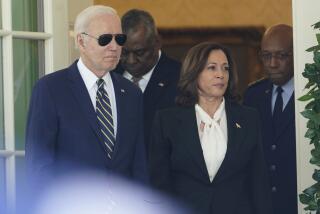A Timely Thriller Finds Snags in the Electoral Process
- Share via
Suppose somebody kidnaped the President-elect. Who would be President if the newly elected chief executive were still being held hostage on Inauguration Day?
That constitutional and political nightmare so intrigued Steven J. Kirsch, a civil attorney in St. Paul, Minn., that he began writing a novel about it in 1980. Little did Kirsch suspect that Indiana Sen. Dan Quayle, with help from Cable News Network’s Bernard Shaw, would suddenly make his book the hot topic on talk shows and elsewhere in the media.
Kirsch’s thriller, “Oath of Office,” was sold to paperback publisher Fawcett/Crest in 1986 and appeared in bookstores this month, its release timed to the final stretch of the presidential campaign.
But what neither Kirsch nor his publisher had foreseen was that in August, Republican presidential nominee George Bush would select Quayle as his running mate and that Democrats would start suggesting that he was too green to be a “heartbeat from the presidency.”
Thursday night, Kirsch said in a phone interview, he “nearly had a heart attack” when Shaw, moderator of the second presidential debate, asked Bush about the 20th Amendment to the U.S. Constitution. (The amendment, one of several spelling out who will succeed an ailing, incapacitated or absent President, was adopted in 1933.)
Shaw read aloud the first sentence of Section 3 of the amendment, which says the vice president-elect shall become President if the President-elect dies before taking office. Then he said to Bush: “Meaning, if you are elected and die . . . automatically, Dan Quayle would become the 41st President of the United States. What have you to say about that possibility?”
Kirsch’s novel actually deals with the section’s second and more complicated sentence, which takes into account numerous other possibilities for succession. And, although the book’s scenario is hardly parallel to Shaw’s, the coincidence fueled further interest in the book, which has already received expressions of interest from national television shows, People magazine and newspapers in the Midwest, where the book was selling well even before the debate.
Kirsch left little doubt about his own point of view: If Bush were kidnaped as President-elect, he said, “the Electoral College . . . would have a reason not to vote for the winning ticket.”
Call it just another coincidence, but Kirsch once worked for a different senator whose vice presidential aptitude was questioned: Missouri Democrat Thomas Eagleton.
More to Read
Sign up for our Book Club newsletter
Get the latest news, events and more from the Los Angeles Times Book Club, and help us get L.A. reading and talking.
You may occasionally receive promotional content from the Los Angeles Times.










